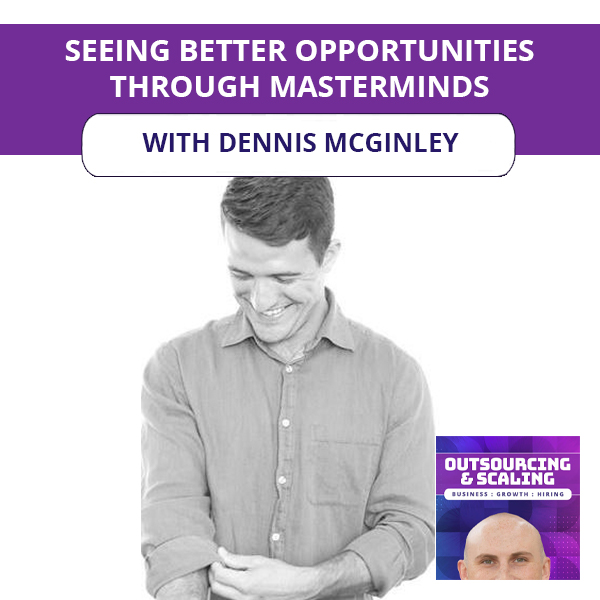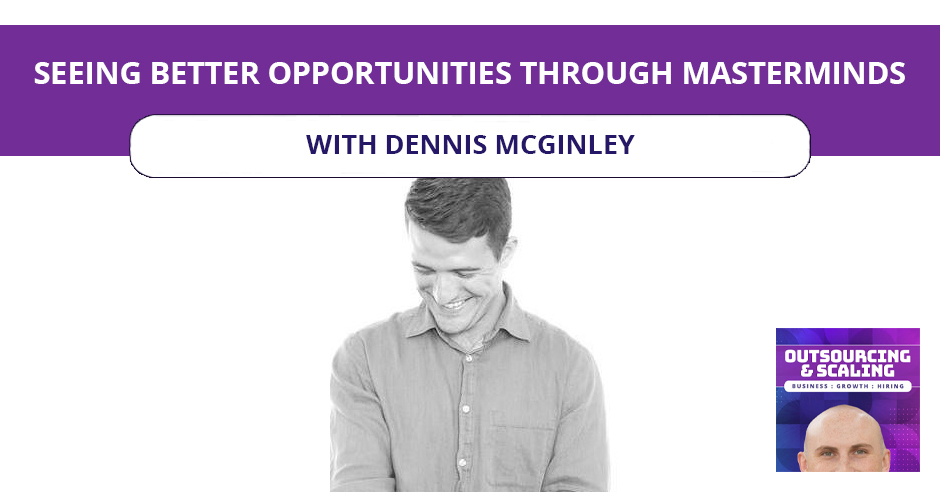


Being surrounded with the right people who adapt to ideal work principles can contribute to overall success, because people who strive to learn from others and strive to have positive well-being are epitomes of triumph. In this episode, Nathan Hirsch talks to Dennis McGinley, the Founder and CEO of the STRIVENT Mastermind and the author of the new book, Impression: A Comprehensive Guide to Optimal Wellbeing. Dennis shares his hiring process, including his simple standards of a simple contractor. He also dives into masterminds – what makes a good mastermind and how masterminds help others see new and better opportunities.
—
Listen to the podcast here:
[smart_track_player url=”https://www.podetize.com/statsapi/www.podetize.com/wp-content/uploads/fileuploads/11-5b145ef137b51b3d1af0633e9305c43d/03/2020/8a279c9c7908bb65af73e0bc14d04fe6.mp3″ title=”Seeing Better Opportunities Through Masterminds With Dennis McGinley” artist=”Nathan Hirsch” image=”https://freeup.net/wp-content/uploads/2019/04/OAS.png” ]
Download the audio file here.
Seeing Better Opportunities Through Masterminds With Dennis McGinley
My guest is Dennis McGinley. Dennis, how are you doing?
I’m doing fantastic. Thanks for having me.
I’m excited to talk to you. Thanks for being here. For those that don’t know, Dennis is the Founder and CEO of the Strivent Mastermind. He runs a growing mastermind community for entrepreneurs, freelancers, business owners and other ambitious leaders to hold each other powerfully accountable to a structure to achieve their goals while sharing insights and lessons from successes and failures along the way. He’s also the author of a new book, Impression: A Comprehensive Guide to Optimal Wellbeing. We’re going to dive into masterminds but first, let’s take a gigantic step back. What were you like growing up as a kid? Were you a straight-A student? Were you a rebel? Did you always know that you wanted to be an entrepreneur?
I was a bit of a paradox. I had a nice facade for family and for the church groups that I was associated with when I was growing up. I had this act like if I look perfect on the outside, then you won’t bother me when I go do what I want to do. I was a little bit of a rebel on the inside, definitely pushing the limits and breaking the rules. I wouldn’t have called myself an entrepreneur growing up, but I had the blood in me at a young age.
Talk to me a little bit about your story. Did you go to college? Did you not? Did you go into corporate and then become an entrepreneur?
I did go to college. I played competitive soccer growing up. For most of those years, I thought that college was where you had to go to play professional soccer one day. I thought it was the stepping stone. I got injured in my first year of college playing soccer there. It was the kick in the face that I needed to sit back and ask myself those bigger questions of what I want to do with my life if I can’t play soccer. I dove into psychology, which allowed me to explore the human mind, human potential, neuroscience, biochemistry, what are we as humans and what we are here for. That led me into the world of business and trying to give myself my own space to explore all of these bigger questions. It wasn’t like I was able to do them on somebody else’s dime.
After college, I opened my first business. It was a residential painting firm. I quickly grew that to some success, where I had a couple of different operations teams and marketing teams working for me. It afforded me the luxury to step back and ask, “Now that I’ve had a win, what do I want to do next? What am I here for? What’s my potential?” I took a full deep dive into the world of personal development and professional development. I opened my first coaching firm back then. It was a men’s coaching firm. I was helping men balance and leverage both masculine and feminine energies in any executive situation they find themselves in.
After that, we opened an adventure coaching firm. We were taking small groups of people on these epic and large scale adventures like climbing Kilimanjaro or staying with these remote indigenous tribes around the world. These are some far-out stuff, almost like a metaphor for getting out of your comfort zone and tackling the mountains you face metaphorically in your day-to-day life. As I was running those businesses, I was traveling the world for fun and for business and running into the same kind of person over and over again. That was somebody who was asking their own bigger questions like, “What’s my full potential look like? Can I bring it out, actualize it and achieve it? What can I achieve if I set my mind to it?”
There was this deeper layer of finding that each of those individuals was existing in isolation, meaning that they didn’t have the support from their family, friends or colleagues to think the same way they did. These people with these big dreams were letting their dreams drift off and weren’t manifesting them. That was sad to me because I felt like I was one of those people. I asked myself this question, “What would it look like if we started a community to support these individuals in actualizing their potential?” That’s exactly what we did. Now we’ve got people from every industry you can imagine from aerospace, automotive, fashion, finance, insurance, marketing and real estate. They’re coming together, holding each other accountable to their big goals both in business and in life and creating an amazing support structure.
As you were building these businesses along the way, I’m assuming you hired a lot of people.
I’ve hired a fair share of people.
Is there any horror story that stands out? What was your worst hiring experience?
I’ve had a couple of what I call lessons learned. Probably the first business was where I learned some of the bigger lessons. My first business was painting and I didn’t know anything about painting. I didn’t even care about painting. I didn’t want to be in that business. I hired and delegated as fast as possible so that I could continue rising myself up to those more executive-level functions. In doing so, I delegated hiring immediately. I hired somebody and then told them to go hire people. He did a fantastic job with what I gave him. The lesson learned is that I wasn’t clear enough with the company vision, the company values and what we needed to hire the right types of people. Our first 3, 4 hires after that were a mess. We had to fire them all within a couple of weeks because they weren’t operating the way we wanted. It was a mess quickly.
What about best hires, anyone that stood out and what made them so good?
I’ve had a number of good hires as well. The best hires are the opposite end of the spectrum. That’s where you spend a little bit more time upfront with them, communicating that company vision and the values. More importantly is the vision, enrolling them and saying, “This is where we’re going. Is this something you want to be a part of? Is this something that you care about as well?” The people who have been my best hires, I’ll speak to one of the coaches who works with me running some of my programs. He came early on. He cares so much about where we’re going as a community as well. Oftentimes, he’s doing things without me asking. He’s taking the initiative, sending me feedback and sending me his thoughts. He’s doing a lot of marketing, advertising or selling on his own. He’s the kind of person where you can’t give them a job description. They’re going to run with it and they’re going to amaze you day after day.
How have you been able to build a culture? What kind of culture do you like to build?

I consider my team to be a closer-knit community, almost like a microcosm of the larger community that we have. It’s similar principles, but relationships is my number one value. I’ll talk to my team maybe once a couple of times a week. Sometimes, we don’t talk about work. I want to know about them. They know what they need to do and what their goals are. It’s like, “I want to know how you are, what things are preventing you from being successful in your work, and what things are helping you be successful.” Let’s have a genuine relationship here and allow that to foster excitement and authenticity when we come to the table. We want to see each other grow and create something awesome together.
Let’s talk about masterminds. When I started being an entrepreneur, it wasn’t on the scene like it is now. I feel like everyone’s starting a mastermind. People that I talked to said that it’s one of the best things they’ve ever done. What does a mastermind mean to you?
I love your context on it. It’s a new thing and there are lots of different types of masterminds. You’ve got masterminds where you can gain entrance for a year for above six figures. You’ve got some with some of the highest name people like Tony Robbins, Dean Graziosi and Russell Brunson, all creating this mastermind for $7 a month. You’ve got quite a range and they each take on their own flavors and have different benefits in there. What I consider to be a mastermind is a mindshare brain trust among individuals with either similar or different expertise and experiences coming together for some agreed-upon amount of time to hold each other accountable to achieving a goal. They help each other see new opportunities and see things from a new perspective and challenge their ways of thinking. It’s about being in that community and allowing yourself to see your blind spots and limiting beliefs and see opportunities that you wouldn’t have seen otherwise.
What makes a good mastermind versus one that’s so-so?
Some of the things that make a mastermind great would be feeling like you’re part of something bigger than yourself. There are a lot of masterminds out there for free, people are starting them. If you pay nothing, you don’t value it as much. There’s a psychology of value there. Paying something does make a mastermind better because you’re going to perceive it better. The second thing would be, do you feel like you’re a part of something or do you feel like you’re somebody watching on the outside and clicking on a couple of things every once in a while? It’s all about taking little tidbits of things that you can use in your life and not about giving. There’s a lot of value in giving and seeing the fact that you’re helping somebody else achieve, seeing them come across a new insight. That’s extremely beneficial. The last thing to build on that second idea would be having an expert coach or facilitator run that program is going to create the right type of mindset inside the community.
Ours is entirely virtual. We’ve got people from coast to coast in the US, a few guys in Canada, some in Bermuda, some in South America. All of them are entrepreneurs, business owners and people living big lives. They’re traveling around the world, tuning in from Thailand or wherever they happen to be. What’s important is being able to come into the conversation whenever they need to. Ours is you have one 90-minute call each week. It’s low enough so that it doesn’t impose on your schedule but it’s enough that you get a lot of value and you feel like you’re part of the community. You’re in this small group 90 minutes a week for three months at a time. The value that you get is enormous. You feel like you’re a part of something bigger than yourself, that people are depending on you to show up week in, week out. They’re asking, “Did you take these 3 or 4 steps that you said you would or not? If so, awesome. Let’s explore what made you successful. Maybe I can borrow that. If not, no problem. What got in the way? How do we make sure that you know yourself as a high performer moving forward?”
What else can you tell us about masterminds? What are behind the scenes that if someone’s never gone to a mastermind before, they should be aware of or should know going in?
The community is important. At the end of the day, it is about you joining something for your benefit. I’ll talk a little bit about intuition. If anything about it feels wrong, slimy or the guy or the gal who’s running it doesn’t know what they’re doing, don’t be a part of that. Take the time to join the right one. Talk to a few other people and find somebody that you do connect with because it’s all about relationships. You want to build a relationship with somebody that you trust. The people in your mastermind are going to become your mentors. They’re going to be people you end up mentoring. If you’re looking for one, connect with the individual running it and with the mentality of people who are in it and how they describe it. If it’s something you can see yourself in the long-term, it’s a good starting spot.
One tip that I got is to go to a mastermind with all your problems, whether it’s personal problems, work-life problems, problems you’re having in your business or something you’ve been stuck on for a while. If you can go in openly and tell people about your problems, chances are that someone has an answer or a solution. There’s someone that can point you in the right direction because they had that problem before and they had created a solution. If you go into it with those issues, but without those solutions, a lot of times that’s where you take away the most.
Our first 90 days in the community break down into three distinct segments. I won’t go into all of it, but the second segment is what we call the hotseat sessions. Everybody in your cohort gets a chance to bring their entire life and their goal to the table during those 90 minutes that one week. The rest of the mastermind dives in with you and says, “What are you trying to achieve and where are you at in relation to that? What’s working in your life to move you forward? What’s not working in your life? What’s getting in the way? Where are you wasting time, money and energy?” That’s when everything comes out on the table. You come into the conversation trying to increase top dollar revenue and you dive in on your relationship with your spouse, not going to the gym or your sleeping quality. We talk about business stuff as well, but everything bubbles up and you get solutions from everywhere.
Talk to me about your book. Wellness is something that a lot of entrepreneurs overlook. We all go in because we want more freedom, a better life. A lot of people get trapped in the day-to-day. They don’t have that balance. As you said, they stopped going to the gym or it hurts their relationships. Why is wellness important?
It’s the foundation of everything. Talking about these three segments of the program, this would be the first one. We start there. We call it optimize the foundations. I’ll talk about it in the context of the book. Everybody’s heard of the downward spiral. To bring a little bit more light to what people mean when they say, “I’m on a downward spiral,” they’re saying, “I didn’t close that sale. That didn’t go well. Because of that I didn’t eat that salad that night. I ate a burger. I woke up feeling terrible. I took it out on my spouse. I went to work the next day feeling bad. I didn’t go to the gym.” It’s like this downward spiral of things. The opposite is also true. We can create upward spirals in our life. It’s the opposite of, “I started my morning with a ten-minute meditation. Because of that, I felt alert and awake. I went for a run or I went to the gym. I had the endorphins flowing. I got to my business meeting this morning. I did close the sale. I was so excited that I took my wife out to dinner.” It’s this upward spiral of things.
Impression is an expansion on a century-old conversation of health equals diet and exercise, but it’s a lot more than that. It is your social, emotional, sexual and financial wellbeing. Impression is an acronym of these ten different elements that are all important to focus on. They’re each individually important and have their own health associated with them. They all interrelate and inter-depend on one another. If you focus on your intellectual wellbeing, your financial wellbeing will increase. From there, it continues to stack.
Dennis, this has been great. I know you have a special offer for my community. Tell them about it. Tell them how they can reach you and what you’re most excited about going forward?
We have a partnership. I love your community as much as you love ours. I’m happy to create the promo code for anybody who comes to the Strivent Mastermind community and wants to get involved with us. I will give you 10% off of your signup fees. I’m excited to see who comes in and joins us.
I appreciate you coming on and have a great rest of the year.
Thanks so much. You too.
Important Links:
- Dennis McGinley – LinkedIn
- Strivent
- Impression: A Comprehensive Guide to Optimal Wellbeing
About Dennis McGinley
 Dennis McGinley is the Founder and CEO of the STRIVENT Mastermind where he runs a growing Mastermind community for entrepreneurs, freelancers, business owners, and other ambitious leaders to hold each other powerfully accountable to a structure to achieve their goals while sharing insights and lessons from successes and failures along the way. He is also the author of the new book, ‘IMPRESSION: A Comprehensive Guide to Optimal Wellbeing’.
Dennis McGinley is the Founder and CEO of the STRIVENT Mastermind where he runs a growing Mastermind community for entrepreneurs, freelancers, business owners, and other ambitious leaders to hold each other powerfully accountable to a structure to achieve their goals while sharing insights and lessons from successes and failures along the way. He is also the author of the new book, ‘IMPRESSION: A Comprehensive Guide to Optimal Wellbeing’.
